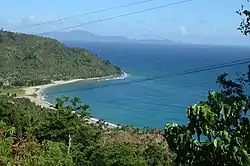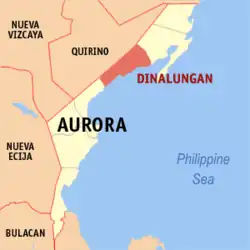Dinalungan | |
|---|---|
| Municipality of Dinalungan | |
 Ditawini beach | |
 Flag | |
 Map of Aurora with Dinalungan highlighted | |
OpenStreetMap | |
.svg.png.webp) Dinalungan Location within the Philippines | |
| Coordinates: 16°06′N 121°46′E / 16.1°N 121.77°E | |
| Country | Philippines |
| Region | Central Luzon |
| Province | Aurora |
| District | Lone district |
| Founded | June 18, 1966 |
| Barangays | 9 (see Barangays) |
| Government | |
| • Type | Sangguniang Bayan |
| • Mayor | Manuel A. Torres |
| • Vice Mayor | Tito T. Tubigan |
| • Representative | Rommel Rico T. Angara |
| • Municipal Council | Members |
| • Electorate | 9,095 voters (2022) |
| Area | |
| • Total | 316.85 km2 (122.34 sq mi) |
| Elevation | 44 m (144 ft) |
| Highest elevation | 491 m (1,611 ft) |
| Lowest elevation | 0 m (0 ft) |
| Population (2020 census)[3] | |
| • Total | 12,508 |
| • Density | 39/km2 (100/sq mi) |
| • Households | 3,116 |
| Economy | |
| • Income class | 4th municipal income class |
| • Poverty incidence | 14.74 |
| • Revenue | ₱ 131.6 million (2020) |
| • Assets | ₱ 178 million (2020) |
| • Expenditure | ₱ 97.55 million (2020) |
| • Liabilities | ₱ 48.75 million (2020) |
| Service provider | |
| • Electricity | Aurora Electric Cooperative (AURELCO) |
| Time zone | UTC+8 (PST) |
| ZIP code | 3206 |
| PSGC | |
| IDD : area code | +63 (0)42 |
| Native languages | Tagalog Ilocano |
| Website | www |
Dinalungan, officially the Municipality of Dinalungan (Tagalog/Kasiguranin: Bayan ng Dinalungan; Ilocano: Ili ti Dinalungan), is a 4th class municipality in the province of Aurora, Philippines. According to the 2020 census, it has a population of 12,508 people.[3]
Two protected areas, the Talaytay Protected Landscape and the Simbahan-Talagas Protected Landscape, are located in the municipality.
Geography
According to the Philippine Statistics Authority, the municipality has a land area of 316.85 square kilometres (122.34 sq mi) [5] constituting 10.07% of the 3,147.32-square-kilometre- (1,215.19 sq mi) total area of Aurora.
Dinalungan is 86 kilometres (53 mi) from Baler and 317 kilometres (197 mi) from Manila.
Barangays
Dinalungan is politically subdivided into 9 barangays.[6] Each barangay consists of puroks and some have sitios.
| PSGC | Barangay | Population | ±% p.a. | |||
|---|---|---|---|---|---|---|
| 2020[3] | 2010[7] | |||||
| 037704001 | Abuleg | 9.9% | 1,236 | 1,190 | 0.38% | |
| 037704002 | Zone I (Poblacion) | 15.0% | 1,881 | 1,866 | 0.08% | |
| 037704003 | Zone II (Poblacion) | 13.3% | 1,666 | 1,653 | 0.08% | |
| 037704004 | Nipoo (Bulo) | 7.2% | 905 | 896 | 0.10% | |
| 037704005 | Dibaraybay | 10.3% | 1,292 | 1,283 | 0.07% | |
| 037704006 | Ditawini | 5.3% | 659 | 686 | −0.40% | |
| 037704007 | Mapalad | 6.1% | 763 | 812 | −0.62% | |
| 037704008 | Paleg | 9.6% | 1,203 | 971 | 2.17% | |
| 037704009 | Simbahan | 13.7% | 1,717 | 1,631 | 0.52% | |
| Total | 12,508 | 10,988 | 1.30% | |||
Climate
| Climate data for Dinalungan, Aurora | |||||||||||||
|---|---|---|---|---|---|---|---|---|---|---|---|---|---|
| Month | Jan | Feb | Mar | Apr | May | Jun | Jul | Aug | Sep | Oct | Nov | Dec | Year |
| Mean daily maximum °C (°F) | 26 (79) |
27 (81) |
28 (82) |
31 (88) |
31 (88) |
31 (88) |
30 (86) |
30 (86) |
30 (86) |
29 (84) |
28 (82) |
26 (79) |
29 (84) |
| Mean daily minimum °C (°F) | 20 (68) |
21 (70) |
22 (72) |
23 (73) |
24 (75) |
25 (77) |
25 (77) |
25 (77) |
24 (75) |
23 (73) |
22 (72) |
21 (70) |
23 (73) |
| Average precipitation mm (inches) | 67 (2.6) |
54 (2.1) |
51 (2.0) |
50 (2.0) |
135 (5.3) |
166 (6.5) |
199 (7.8) |
191 (7.5) |
188 (7.4) |
157 (6.2) |
102 (4.0) |
104 (4.1) |
1,464 (57.5) |
| Average rainy days | 17.0 | 13.9 | 14.6 | 13.7 | 20.9 | 22.4 | 25.8 | 26.0 | 24.9 | 19.3 | 15.7 | 16.6 | 230.8 |
| Source: Meteoblue (modeled/calculated data, not measured locally)[8] | |||||||||||||
Demographics
| Year | Pop. | ±% p.a. |
|---|---|---|
| 1970 | 4,577 | — |
| 1975 | 3,718 | −4.08% |
| 1980 | 5,242 | +7.11% |
| 1990 | 6,770 | +2.59% |
| 1995 | 8,187 | +3.63% |
| 2000 | 9,711 | +3.73% |
| 2007 | 10,145 | +0.60% |
| 2010 | 10,988 | +2.95% |
| 2015 | 11,322 | +0.57% |
| 2020 | 12,508 | +1.98% |
| Source: Philippine Statistics Authority[9][7][10][11] | ||
In the 2020 census, Dinalungan had a population of 12,508.[3] The population density was 39 inhabitants per square kilometre (100/sq mi).
Economy
References
- ↑ Municipality of Dinalungan | (DILG)
- ↑ "2015 Census of Population, Report No. 3 – Population, Land Area, and Population Density" (PDF). Philippine Statistics Authority. Quezon City, Philippines. August 2016. ISSN 0117-1453. Archived (PDF) from the original on May 25, 2021. Retrieved July 16, 2021.
- 1 2 3 4 Census of Population (2020). "Region III (Central Luzon)". Total Population by Province, City, Municipality and Barangay. Philippine Statistics Authority. Retrieved 8 July 2021.
- ↑ "PSA Releases the 2018 Municipal and City Level Poverty Estimates". Philippine Statistics Authority. 15 December 2021. Retrieved 22 January 2022.
- ↑ "Province: Aurora". PSGC Interactive. Quezon City, Philippines: Philippine Statistics Authority. Retrieved 12 November 2016.
- ↑ "Municipal: Dinalungan". PSGC Interactive. Quezon City, Philippines: Philippine Statistics Authority. Retrieved 8 January 2016.
- 1 2 Census of Population and Housing (2010). "Region III (Central Luzon)" (PDF). Total Population by Province, City, Municipality and Barangay. National Statistics Office. Retrieved 29 June 2016.
- ↑ "Dinalungan, Aurora: Average Temperatures and Rainfall". Meteoblue. Retrieved 27 December 2018.
- ↑ Census of Population (2015). "Region III (Central Luzon)". Total Population by Province, City, Municipality and Barangay. Philippine Statistics Authority. Retrieved 20 June 2016.
- ↑ Censuses of Population (1903–2007). "Region III (Central Luzon)". Table 1. Population Enumerated in Various Censuses by Province/Highly Urbanized City: 1903 to 2007. National Statistics Office.
{{cite encyclopedia}}: CS1 maint: numeric names: authors list (link) - ↑ "Province of Aurora". Municipality Population Data. Local Water Utilities Administration Research Division. Retrieved 17 December 2016.
- ↑ "Poverty incidence (PI):". Philippine Statistics Authority. Retrieved December 28, 2020.
- ↑ "Estimation of Local Poverty in the Philippines" (PDF). Philippine Statistics Authority. 29 November 2005.
- ↑ "2003 City and Municipal Level Poverty Estimates" (PDF). Philippine Statistics Authority. 23 March 2009.
- ↑ "City and Municipal Level Poverty Estimates; 2006 and 2009" (PDF). Philippine Statistics Authority. 3 August 2012.
- ↑ "2012 Municipal and City Level Poverty Estimates" (PDF). Philippine Statistics Authority. 31 May 2016.
- ↑ "Municipal and City Level Small Area Poverty Estimates; 2009, 2012 and 2015". Philippine Statistics Authority. 10 July 2019.
- ↑ "PSA Releases the 2018 Municipal and City Level Poverty Estimates". Philippine Statistics Authority. 15 December 2021. Retrieved 22 January 2022.
External links
- Philippine Standard Geographic Code
- Dinalungan on Aurora.ph